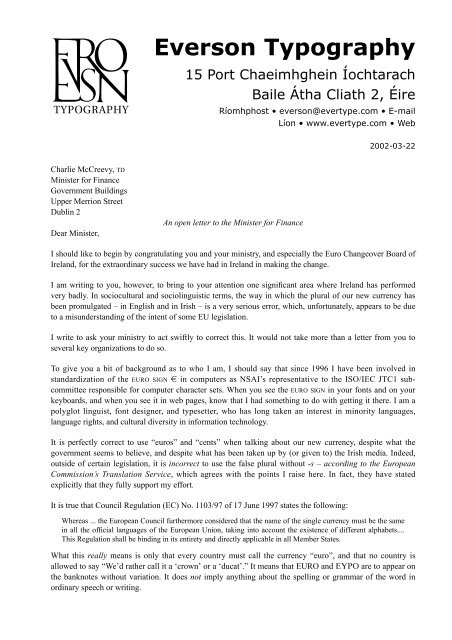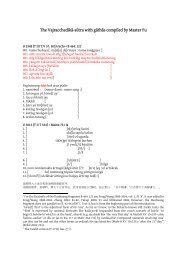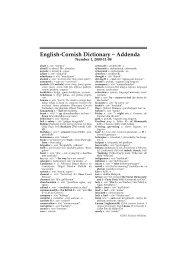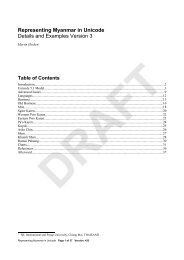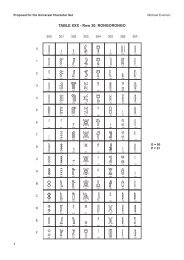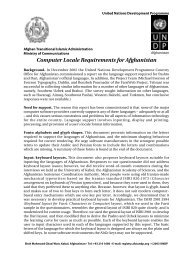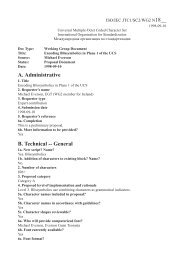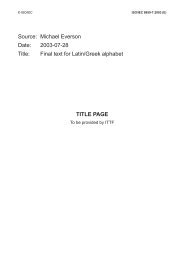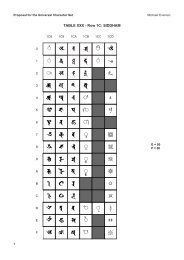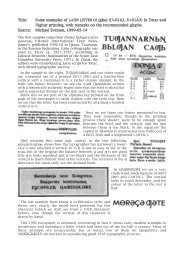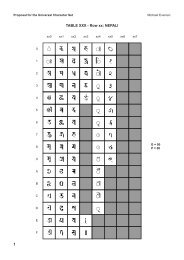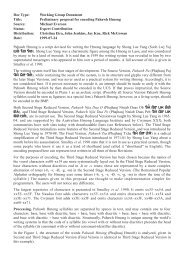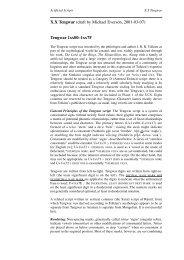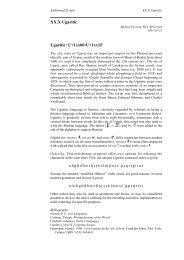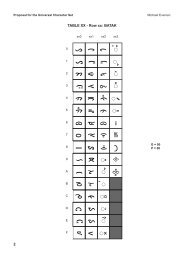open letter to the Irish Minister for Finance - Evertype
open letter to the Irish Minister for Finance - Evertype
open letter to the Irish Minister for Finance - Evertype
Create successful ePaper yourself
Turn your PDF publications into a flip-book with our unique Google optimized e-Paper software.
¨TYPOGRAPHY<br />
Charlie McCreevy, TD<br />
<strong>Minister</strong> <strong>for</strong> <strong>Finance</strong><br />
Government Buildings<br />
Upper Merrion Street<br />
Dublin 2<br />
Dear <strong>Minister</strong>,<br />
Everson Typography<br />
15 Port Chaeimhghein Íochtarach<br />
Baile Átha Cliath 2, Éire<br />
Ríomhphost • everson@evertype.com • E-mail<br />
Líon • www.evertype.com • Web<br />
An <strong>open</strong> <strong>letter</strong> <strong>to</strong> <strong>the</strong> <strong>Minister</strong> <strong>for</strong> <strong>Finance</strong><br />
I should like <strong>to</strong> begin by congratulating you and your ministry, and especially <strong>the</strong> Euro Changeover Board of<br />
Ireland, <strong>for</strong> <strong>the</strong> extraordinary success we have had in Ireland in making <strong>the</strong> change.<br />
I am writing <strong>to</strong> you, however, <strong>to</strong> bring <strong>to</strong> your attention one significant area where Ireland has per<strong>for</strong>med<br />
very badly. In sociocultural and sociolinguistic terms, <strong>the</strong> way in which <strong>the</strong> plural of our new currency has<br />
been promulgated – in English and in <strong>Irish</strong> – is a very serious error, which, un<strong>for</strong>tunately, appears <strong>to</strong> be due<br />
<strong>to</strong> a misunderstanding of <strong>the</strong> intent of some EU legislation.<br />
I write <strong>to</strong> ask your ministry <strong>to</strong> act swiftly <strong>to</strong> correct this. It would not take more than a <strong>letter</strong> from you <strong>to</strong><br />
several key organizations <strong>to</strong> do so.<br />
To give you a bit of background as <strong>to</strong> who I am, I should say that since 1996 I have been involved in<br />
standardization of <strong>the</strong> EURO SIGN ~ in computers as NSAI’s representative <strong>to</strong> <strong>the</strong> ISO/IEC JTC1 subcommittee<br />
responsible <strong>for</strong> computer character sets. When you see <strong>the</strong> EURO SIGN in your fonts and on your<br />
keyboards, and when you see it in web pages, know that I had something <strong>to</strong> do with getting it <strong>the</strong>re. I am a<br />
polyglot linguist, font designer, and typesetter, who has long taken an interest in minority languages,<br />
language rights, and cultural diversity in in<strong>for</strong>mation technology.<br />
It is perfectly correct <strong>to</strong> use “euros” and “cents” when talking about our new currency, despite what <strong>the</strong><br />
government seems <strong>to</strong> believe, and despite what has been taken up by (or given <strong>to</strong>) <strong>the</strong> <strong>Irish</strong> media. Indeed,<br />
outside of certain legislation, it is incorrect <strong>to</strong> use <strong>the</strong> false plural without -s – according <strong>to</strong> <strong>the</strong> European<br />
Commission’s Translation Service, which agrees with <strong>the</strong> points I raise here. In fact, <strong>the</strong>y have stated<br />
explicitly that <strong>the</strong>y fully support my ef<strong>for</strong>t.<br />
It is true that Council Regulation (EC) No. 1103/97 of 17 June 1997 states <strong>the</strong> following:<br />
2002-03-22<br />
Whereas ... <strong>the</strong> European Council fur<strong>the</strong>rmore considered that <strong>the</strong> name of <strong>the</strong> single currency must be <strong>the</strong> same<br />
in all <strong>the</strong> official languages of <strong>the</strong> European Union, taking in<strong>to</strong> account <strong>the</strong> existence of different alphabets....<br />
This Regulation shall be binding in its entirety and directly applicable in all Member States.<br />
What this really means is only that every country must call <strong>the</strong> currency “euro”, and that no country is<br />
allowed <strong>to</strong> say “We’d ra<strong>the</strong>r call it a ‘crown’ or a ‘ducat’.” It means that EURO and ∂Àƒ√ are <strong>to</strong> appear on<br />
<strong>the</strong> banknotes without variation. It does not imply anything about <strong>the</strong> spelling or grammar of <strong>the</strong> word in<br />
ordinary speech or writing.
There is no reason <strong>to</strong> believe that <strong>the</strong> word must be invariable or that it shall be immune <strong>to</strong> <strong>the</strong> grammar of<br />
natural languages. Indeed, <strong>the</strong> European Commission Translation Service’s English Style Guide 1 states<br />
specifically that <strong>the</strong> s-less <strong>for</strong>m should be used only when quoting legislation which uses it, and that in o<strong>the</strong>r<br />
contexts <strong>the</strong> normal English plural should be used:<br />
Guidelines on <strong>the</strong> use of <strong>the</strong> euro, issued via <strong>the</strong> Secretariat-General, state that <strong>the</strong> plurals of both ‘euro’ and<br />
‘cent’ are <strong>to</strong> be written without ‘s’ in English. Do this when amending or referring <strong>to</strong> legal texts that <strong>the</strong>mselves<br />
observe this rule. Elsewhere, and especially in documents intended <strong>for</strong> <strong>the</strong> general public, use <strong>the</strong> natural plural<br />
with ‘s’ <strong>for</strong> both terms. (My italics.)<br />
At a meeting of <strong>the</strong> Monetary Committee in 1998, <strong>the</strong> Euro Changeover Board – fearing that <strong>the</strong> use of<br />
different spellings <strong>for</strong> <strong>the</strong> single currency might lead <strong>to</strong> legal problems – claimed that “euro” and “cent”<br />
should be invariable in all languages, as decided in Madrid and Verona. The principle of invariable spelling<br />
was <strong>the</strong>re<strong>for</strong>e accepted, but some countries (Finland, France, Portugal, Spain) got it accepted at an early<br />
stage that <strong>the</strong> plural inflections natural <strong>to</strong> <strong>the</strong>ir languages would be used. In addition, Greece was “allowed”<br />
not only continued use of <strong>the</strong> word <strong>for</strong> <strong>the</strong> drachma subdivision (ÏÂappleÙfi) but also its plural inflection (ÏÂappleÙ¿).<br />
In practice, <strong>the</strong>re<strong>for</strong>e, “invariable” meant “invariable <strong>for</strong> some languages but not <strong>for</strong> o<strong>the</strong>rs” right from <strong>the</strong><br />
start. Ireland did not make a similar decision – but we should have done. Why not insist upon <strong>the</strong> natural<br />
plural in English? There is no reason not <strong>to</strong> do so.<br />
Television and radio news and advertisement is certainly meant <strong>for</strong> <strong>the</strong> general public. Surely <strong>the</strong> <strong>Irish</strong><br />
government should take account of <strong>the</strong> recommendation of <strong>the</strong> European Commission’s Translation Service<br />
and encourage <strong>Irish</strong> television and radio news and advertisement <strong>to</strong> “use <strong>the</strong> natural plural with ‘s’ <strong>for</strong> both<br />
terms”!<br />
It is true that <strong>the</strong> invariant plural was used in <strong>Irish</strong> legislation, in both English and <strong>Irish</strong> in section 11(1) of<br />
<strong>the</strong> Economic and Monetary Union Act, 1998. It is also used in two o<strong>the</strong>r EU regulations: Council<br />
Regulation (EC) No. 974/98 of 3 May 1998 on <strong>the</strong> introduction of <strong>the</strong> euro stipulates that “one euro shall be<br />
divided in<strong>to</strong> one hundred cent” (Article 2), and “as from 1 January 2002, <strong>the</strong> ECB and <strong>the</strong> central banks of<br />
<strong>the</strong> participating Member States shall put in<strong>to</strong> circulation banknotes denominated in euro” (Article 10), and<br />
finally that “as from 1 January 2002, <strong>the</strong> participating Member States shall issue coins denominated in euro<br />
or in cent” (Article 11). Regulation (EC) No. 2560/2001 of <strong>the</strong> European Parliament and of <strong>the</strong> Council of<br />
19 December 2001 on cross-border payments in euros talks about cross-border payments in euro, crossborder<br />
payment transactions in euro and cross-border credit transfers in euro. (My italics.)<br />
But <strong>the</strong> <strong>Irish</strong> finance ministry has implemented <strong>the</strong> s-less plurals in contexts o<strong>the</strong>r than legislative ones, such<br />
as in <strong>the</strong> publications of <strong>the</strong> Euro Changeover Board of Ireland and <strong>the</strong> Revenue.<br />
When <strong>the</strong> ECBI began its campaign with advertisements featuring Kian Egan and Paul McGrath, both of<br />
<strong>the</strong>m said “one euro and twenty-seven cents”, correctly using <strong>the</strong> natural English plural. On 17 November<br />
2000 I received some printed material from <strong>the</strong> ECBI which used <strong>the</strong> “legislative” plural. I contacted <strong>the</strong><br />
ECBI and complained that this was a bad thing <strong>to</strong> do. I was given <strong>the</strong> following answer: “It’s true that all<br />
official documents use euro and cent in all instances but we accept that <strong>the</strong> reality is that people will say euros<br />
and cents, and this is reflected in our current advertising campaign.” This was not <strong>the</strong> case, however, and all<br />
<strong>the</strong> rest of <strong>the</strong> ECBI’s adverts had news presenters and ac<strong>to</strong>rs saying “one euro and twenty-seven cent”.<br />
Then came Budget Day. Now, everyone watches Budget Day and you yourself certainly did a fine job of<br />
using <strong>the</strong> “legislative” plural. Un<strong>for</strong>tunately, this had an enormous impact.<br />
The news media and advertisers are conscientiously saying “euro” and “cent” when <strong>the</strong> natural English<br />
plurals “euros” and “cents” are expected. It is jarring <strong>to</strong> <strong>the</strong> ear and confusing <strong>to</strong> <strong>the</strong> average citizen. In<br />
January I was in Cleary’s buying a kettle priced at €40. One of <strong>the</strong> cashiers said that <strong>the</strong> ten per cent discount<br />
would be “four euros”; <strong>the</strong> o<strong>the</strong>r cashier <strong>to</strong>ld me that <strong>the</strong> price would <strong>the</strong>re<strong>for</strong>e be “thirty-six euro”. Last<br />
week in <strong>the</strong> Centra in Camden Street an Australian clerk (who would have grown up with “dollars” and<br />
1 http://europa.eu.int/comm/translation/en/stygd/enstyle.htm
“cents”) used <strong>the</strong> plural “cent” with me when handing me back my change. When I queried her on this, she<br />
said, “Well, <strong>the</strong>y changed it, you know.”<br />
They?<br />
Yesterday in an off-licence in Camden Street I saw a notice that “15 cent” was <strong>to</strong> be charged on plastic bags,<br />
and I asked <strong>the</strong> shop proprie<strong>to</strong>r about it. He said that he used that spelling because although he himself<br />
prefers <strong>to</strong> say “15 cents”, he felt that he was obliged <strong>to</strong> write it without <strong>the</strong> -s because that was “official”.<br />
Exactly what well-in<strong>for</strong>med linguistic authority is it that imposed such a change <strong>to</strong> our language on him?<br />
The Council of Europe?<br />
And <strong>to</strong>day when I spoke <strong>to</strong> a woman serving me coffee about this matter, I <strong>to</strong>ld her that <strong>the</strong> Commission’s<br />
Translation Service recommended <strong>the</strong> natural plural. A huge smile broke on<strong>to</strong> her face and she said “You<br />
mean we have permission <strong>to</strong> say ‘euros’? It’s really hard <strong>to</strong> remember <strong>to</strong> say ‘three euro’.”<br />
Must we have permission <strong>to</strong> speak English naturally?<br />
On <strong>the</strong> streets throughout <strong>the</strong> country, a great many people are saying “euros”. But one also finds that many<br />
merchants are saying “euro”, or are trying <strong>to</strong> avoid <strong>the</strong> issue by omitting <strong>the</strong> currency name al<strong>to</strong>ge<strong>the</strong>r. This<br />
is where Ireland has per<strong>for</strong>med badly in <strong>the</strong> changeover. People feel uncertain and uncom<strong>for</strong>table. It’s<br />
natural <strong>to</strong> say “euros and cents” but <strong>the</strong> media continue <strong>to</strong> impress upon us that we’re “supposed” <strong>to</strong> say<br />
“euro and cent”. We, <strong>the</strong> <strong>Irish</strong> people, should not be made <strong>to</strong> feel uncom<strong>for</strong>table about any aspect of our new<br />
currency – least of all how <strong>to</strong> say it naturally.<br />
It is my belief that <strong>the</strong> <strong>Irish</strong> Government misunders<strong>to</strong>od <strong>the</strong> intent of Council Regulation (EC) No. 1103/97<br />
and that we are suffering from that misunderstanding now. Some people have even suggested that “cent”<br />
could be <strong>the</strong> plural <strong>for</strong> <strong>the</strong> euro subdivision, while “cents” could be retained <strong>for</strong> <strong>the</strong> US, Canadian,<br />
Australian, Hong Kong and o<strong>the</strong>r currencies – but this is both objectionable in principle and impossible in<br />
practice. I have seen more than one RTÉ presenter read off <strong>the</strong> exchange rates between <strong>the</strong> euro and <strong>the</strong><br />
dollar, saying, in obvious error, “one dollar and fifteen cent”. This is in<strong>to</strong>lerable – it makes us all look ra<strong>the</strong>r<br />
ridiculous. The media in <strong>the</strong> US quite happily use <strong>the</strong> natural plurals “euros” and “cents” in all contexts and<br />
<strong>the</strong> Washing<strong>to</strong>n Post has ridiculed <strong>the</strong> “legislative” plural – doubtless not <strong>the</strong> only newspaper <strong>to</strong> do so.<br />
It is important <strong>to</strong> note that in France, Portugal, and Spain, <strong>the</strong> official <strong>for</strong>ms are pluralized naturally: euros<br />
and centimes, cêntimos, and céntimos respectively. In Catalunya, <strong>the</strong> Institut d’Estudis Catalans published an<br />
official recommendation in January 1998 that euros and cents (or cèntims) be used. 2 Why may we not write<br />
and say euros and cents in English? There is no reason. The Greeks are “allowed” <strong>to</strong> engrave, instead of<br />
cent, <strong>the</strong>ir own word on <strong>the</strong>ir coins – (§∂∆√, and plural §∂∆∞, appear on Greek coins while CENT<br />
appears on <strong>the</strong> o<strong>the</strong>r national coins) and <strong>the</strong> Finns are “permitted” <strong>to</strong> write <strong>the</strong> nominative plural eurot, <strong>the</strong><br />
partitive singular euroa (after numbers) as well as <strong>the</strong> nominative singular sentti, nominative plural sentit,<br />
and partitive singular sentiä (after numbers). A Commission document giving <strong>the</strong> <strong>for</strong>ms that are <strong>to</strong> be used<br />
in Community legislation is attached. 3 Note that <strong>the</strong> author of this document has added a footnote<br />
apologizing <strong>for</strong>, but hardly defending, <strong>the</strong> bad grammar: “This spelling without an ‘s’ may be seen as<br />
departing from usual English practice <strong>for</strong> currencies.” There is no attempt <strong>to</strong> explain why <strong>the</strong> English plural<br />
should be anomalous while <strong>the</strong> French, Portuguese, and Spanish all have plurals in -s. The error is that<br />
Ireland did not seek <strong>to</strong> defend natural grammar in 1998 when o<strong>the</strong>r countries did.<br />
In fact, <strong>the</strong>re is no real reason <strong>to</strong> use pluralless <strong>for</strong>ms even in legislation in English – but, in my opinion,<br />
what’s written in <strong>the</strong> legislation isn’t that important, even if <strong>the</strong> grammar is incorrect. What is important is<br />
that we care about what newsreaders and advertisers broadcast in<strong>to</strong> our homes on television and radio, and<br />
about what <strong>Irish</strong> shoppers and shopkeepers say <strong>to</strong> each o<strong>the</strong>r when we use our new currency.<br />
2http://www.iec.es/institucio/seccions/Filologica/llenguacatalana/documentsnormatius/euro.htm<br />
3 From http://europa.eu.int/euro/ html/dossiers/00219/00219-en.pdf
Again, it is a certainty that native speakers of English in o<strong>the</strong>r countries, such as <strong>the</strong> US, Canada, Australia,<br />
New Zealand, and South Africa, are already saying “euros and cents”. It is not difficult <strong>to</strong> imagine that<br />
British subjects in <strong>the</strong> euro-sceptic UK will consider <strong>the</strong> ungrammatical plurals “euro and cent” <strong>to</strong> be<br />
unacceptable changes <strong>to</strong> “<strong>the</strong> Queen’s English” and that <strong>the</strong>y will fiercely resist <strong>the</strong>m as an assault on good<br />
sense – jeopardizing <strong>the</strong> UK’s prospective entrance <strong>to</strong> <strong>the</strong> EMU. If, on <strong>the</strong> o<strong>the</strong>r hand, Ireland takes <strong>the</strong> lead<br />
here, at least this objection <strong>to</strong> <strong>the</strong> introduction of <strong>the</strong> euro in <strong>the</strong> UK will be removed. And that is certainly in<br />
<strong>the</strong> interests of Ireland as well as of Europe as a whole.<br />
In any case, <strong>for</strong> us in Ireland <strong>to</strong> parrot <strong>the</strong> artificial “euro and cent” is just plain silly, if not downright<br />
embarrassing.<br />
There are problems with <strong>the</strong> word in <strong>Irish</strong> as well. Texts are being published which say an euro, making us<br />
assume that <strong>the</strong> word is feminine (<strong>the</strong> masculine would be an t-euro) but <strong>the</strong> genitive in those same texts is<br />
an euro where <strong>the</strong> feminine should be na heuro. So <strong>the</strong> word is nei<strong>the</strong>r masculine nor feminine. Nor <strong>Irish</strong> at<br />
all. Euro also violates <strong>Irish</strong> spelling rules. The correct <strong>for</strong>ms should be an eoró, genitive na heoró, plural<br />
eorónna – based on an Eoraip, while accepting <strong>the</strong> ending -ó on <strong>the</strong> strength of <strong>the</strong> English euro. 4 Ceint<br />
(plural ceinteanna) was published in de Bhaldrai<strong>the</strong>’s 1959 dictionary, and in <strong>the</strong> Gúm’s 1989 dictionary<br />
Foclóir Staidéir Ghnó.<br />
I believe that this is a very serious issue. I trust that you will review <strong>the</strong> situation and change current<br />
government policy by in<strong>for</strong>ming <strong>the</strong> media explicitly that <strong>the</strong>y are encouraged – not “allowed” – <strong>to</strong> use <strong>the</strong><br />
normal English plurals, “euros” and “cents”. If you will do so, your action would alleviate <strong>the</strong> confusion <strong>the</strong><br />
<strong>Irish</strong> people have about which <strong>for</strong>m is right and which <strong>for</strong>m is wrong. We need your leadership here, or <strong>the</strong><br />
uncertainty will surely continue.<br />
The Commission’s instructions on spelling – though <strong>the</strong>y did not say so clearly enough – related only <strong>to</strong> EU<br />
legal acts and were not, one must assume, an attempt <strong>to</strong> influence <strong>the</strong> everyday speaking and writing habits<br />
of European citizens.<br />
I call on you, <strong>Minister</strong>, <strong>to</strong> issue a statement <strong>to</strong> <strong>the</strong> edi<strong>to</strong>rs of Ireland’s newspapers, broadcast media, banks,<br />
and government departments, <strong>to</strong> encourage <strong>the</strong> use of <strong>the</strong> natural plurals of <strong>the</strong>se words in English and <strong>Irish</strong>.<br />
I should be very pleased <strong>to</strong> clarify any point made here or <strong>to</strong> assist in any way I can <strong>to</strong> facilitate this<br />
important aspect of <strong>the</strong> euro changeover.<br />
Yours faithfully,<br />
˛<br />
Michael Everson<br />
4 For more in<strong>for</strong>mation, see my paper in <strong>Irish</strong>: “Euro nó eora? Cent nó ceint? An t-airgeadra nua agus Éire”, or its English<br />
translation: “Euro or eora? Cent or ceint? The new currency and Ireland” at http://www.evertype.com/standards/<br />
euro/index.html. A guide <strong>to</strong> correct <strong>for</strong>matting and usage of <strong>the</strong> euro sign in speech and writing is also on my site.
English Style Guide<br />
12.9 Currency abbreviations. The Publications Office uses a single list, ISO 4217, <strong>for</strong> both OJ work and non-OJ work. The full list,<br />
recommended <strong>for</strong> use in <strong>the</strong> Commission by its Secretariat-General in 1996, can be found online at http://europa.eu.int/comm/<br />
translation/currencies/entable1.htm.<br />
The following table shows <strong>the</strong> names and abbreviations/symbols <strong>for</strong> <strong>the</strong> currencies of <strong>the</strong><br />
EU Member States and some o<strong>the</strong>r countries.<br />
Official name ISO 4217<br />
ECU XEU ( Exception <strong>to</strong> rule: use ECU instead)<br />
euro, pl. euros EUR<br />
Austrian schilling ATS<br />
Belgian franc BEF<br />
German mark DEM<br />
Danish krone, pl. kroner DKK<br />
Spanish peseta ESP<br />
Finnish markka, pl. markkaa FIM<br />
French franc FRF<br />
pound sterling GBP<br />
Greek drachma GRD<br />
<strong>Irish</strong> pound (punt) IEP<br />
Italian lira, pl. lire ITL<br />
Luxembourg franc LUF<br />
Dutch guilder NLG<br />
Portuguese escudo PTE<br />
Swedish krona, pl. kronor SEK<br />
Note also:<br />
Canadian dollar CAD<br />
US dollar USD<br />
Swiss franc CHF<br />
Norwegian krone, pl. kroner NOK<br />
Turkish lira TRL<br />
Japanese yen JPY<br />
12.10 The currency abbreviation precedes <strong>the</strong> amount and takes a space:<br />
FRF 2 400; EUR 3 500; EUR 2 billion<br />
When used, currency symbols are closed up:<br />
$100; £78; €120<br />
12.11 Where a sum is written in words, use <strong>the</strong> <strong>for</strong>m shown in <strong>the</strong> table above: a sum of seven million German marks, two million ecus.<br />
12.12 The euro.<br />
Like 'pound', 'dollar' or any o<strong>the</strong>r currency name, <strong>the</strong> word 'euro' is normally written in lower case with no initial<br />
capital.<br />
In tables and documents where monetary amounts figure largely, make maximum use of <strong>the</strong> abbreviation EUR (be<strong>for</strong>e <strong>the</strong><br />
amount) or <strong>the</strong> € symbol (closed up <strong>to</strong> <strong>the</strong> figure). Note that <strong>the</strong> € symbol is still not used in <strong>the</strong> Official Journal.<br />
Guidelines on <strong>the</strong> use of <strong>the</strong> euro, issued via <strong>the</strong> Secretariat-General, state that <strong>the</strong> plurals of both 'euro' and 'cent' are <strong>to</strong> be<br />
written without 's' in English. Do this when amending or referring <strong>to</strong> legal texts that <strong>the</strong>mselves observe this rule. Elsewhere,<br />
and especially in documents intended <strong>for</strong> <strong>the</strong> general public, use <strong>the</strong> natural plural with 's' <strong>for</strong> both terms.<br />
12.13 Use a point <strong>to</strong> separate units from subunits:<br />
Price: FRF 7.20; BEF 50.-.<br />
http://europa.eu.int/comm/translation/en/stygd/enstyle.htm<br />
2002-03-12 12:46<br />
Page 29 of 70
Institut d’Estudis Catalans<br />
Altres documents normatius<br />
TERMES QUE DESIGNEN LA UNITAT DE MONEDA EUROPEA I LA SEVA SUBDIVISIÓ: L’ EURO I EL CENT<br />
(Acord de la Secció Filològica del 16 de gener de 1998)<br />
1<br />
Els termes masculins euro (’unitat monetària de la Unió Europea’) i cent (’centèsima part de l’euro’) prenen en<br />
plural les <strong>for</strong>mes euros i cents,<br />
respectivament, d’acord amb les regles de <strong>for</strong>mació del plural en català.<br />
2<br />
Tanmateix, d’acord amb el considerant número 2 de la Proposta de reglament (CE) adoptada pel Consell de la<br />
Unió Europea el 7 de juliol de 1997, relativa a la introducció de l'euro, «l’elecció del nom cent no impedeix la<br />
utilització de variants d’aquesta denominació en l’ús quotidià dels estats membres». Així doncs, res no obsta<br />
perquè el mot cèntim,<br />
que ja existeix en la llengua catalana, pugui designar també, quan per<strong>to</strong>qui, la centèsima<br />
part de la moneda que substituirà la pesseta. Aquest significat ja és recollit en el Diccionari de la llengua catalana,<br />
atès que el mot hi és definit com a «moneda que val la centèsima part d’una unitat monetària».<br />
Per aquest motiu, la Secció Filològica recomana d’emprar, preferiblement, el terme cèntim com a designació usual<br />
en català de la subdivisió de l’euro.<br />
3<br />
Finalment, la Secció Filològica considera que, en la pronúncia dels termes euro i cent,<br />
s’han de tenir en compte les<br />
diferències fonètiques derivades de la diversitat dialectal que afecten, especialment, la qualitat de les vocals<br />
d’aquests dos mots i el grup consonàntic nt del mot cent. Així, per exemple, en el cas del català central, la e de<br />
<strong>to</strong>ts dos mots s’ha de pronunciar oberta, i la vocal final de euro s’ha de pronunciar com una u;<br />
i, en el cas del<br />
valencià, la t de cent s’ha de pronunciar.<br />
Documents normatius (1962-1996)<br />
http://www.iec.es/institucio/seccions/Filologica/llenguacatalana/documentsnormatius/euro.htm<br />
2002-03-12 12:48<br />
Page 1 of 1
Spelling of <strong>the</strong> words “euro” and “cent” in <strong>the</strong> official<br />
Community languages - <strong>to</strong> be used when drawing up<br />
Community Legislative acts<br />
expressed as an amount ********* with definite article<br />
language one unit several units singular plural<br />
DA 1 euro<br />
1 cent<br />
DE 1 Euro<br />
1Cent<br />
EL ευρώ 1<br />
λεπτό 1<br />
EN 1 euro<br />
1 cent<br />
ES 1 euro<br />
1 cent<br />
FR 1 euro<br />
1 cent<br />
IT 1 euro<br />
1 cent<br />
NL 1 euro<br />
1 cent<br />
PT 1 euro<br />
1 cent<br />
FI 1 euro<br />
1 sentti<br />
SV 1 euro<br />
1 cent<br />
_____________________________<br />
100 euro<br />
100 cent<br />
100 Euro<br />
100 Cent<br />
ευρώ 100<br />
λεπτά 100<br />
100 euro 1<br />
100 cent 1<br />
100 euros<br />
100 cents<br />
100 euros<br />
100 cents<br />
100 euro<br />
100 cent<br />
100 euro<br />
100 cent<br />
100 euros<br />
100 cents<br />
100 euroa 2<br />
100 senttiä 2<br />
100 euro<br />
100 cent<br />
euroen<br />
centen<br />
der Euro<br />
der Cent<br />
το ευρώ<br />
<strong>the</strong> euro<br />
<strong>the</strong> cent<br />
το λεπτό<br />
el euro<br />
el cent<br />
l`euro<br />
le cent<br />
l’euro<br />
il cent<br />
de euro<br />
de cent<br />
oeuro<br />
o cent<br />
euro<br />
sentti<br />
euron 3<br />
centen<br />
euroene<br />
centene<br />
die Euro<br />
die Cent<br />
τа ευρώ<br />
<strong>the</strong> euro 1<br />
τа λεπτά<br />
<strong>the</strong> cent 1<br />
los euros<br />
los cents<br />
les euros<br />
les cents<br />
gli euro<br />
icent<br />
de euro’s<br />
de centen<br />
os euros<br />
os cents<br />
eurot<br />
sentit<br />
eurorna 3<br />
centen<br />
1 This spelling without an “s” may be seen as departing from usual English practice <strong>for</strong><br />
currencies.<br />
2 The <strong>for</strong>m used is <strong>the</strong> singular partitive <strong>for</strong>m.<br />
3 Used <strong>for</strong> references <strong>to</strong> “<strong>the</strong> currency” or coins.
The official abbreviation, according <strong>to</strong> ISO 4217, <strong>for</strong> “euro” is “EUR” in all languages.<br />
There is no official abbreviation <strong>for</strong> “cent”, but one could reflect on using ei<strong>the</strong>r “c”<br />
or “ct”.


